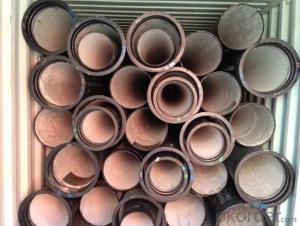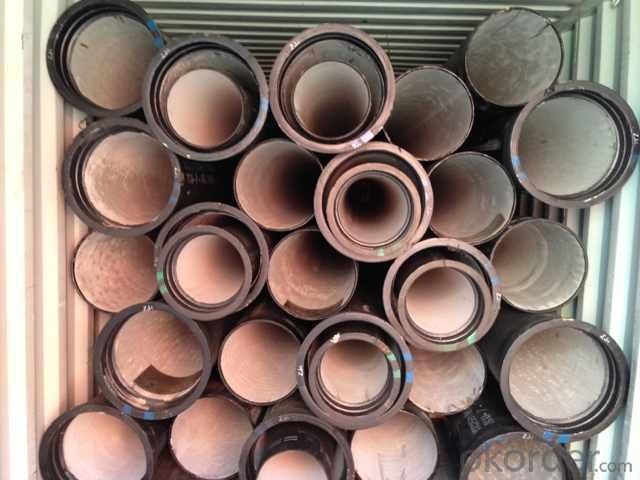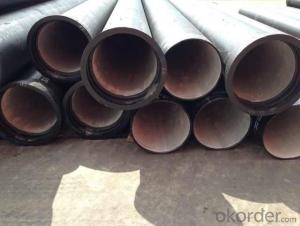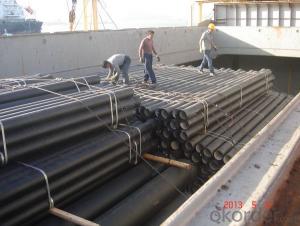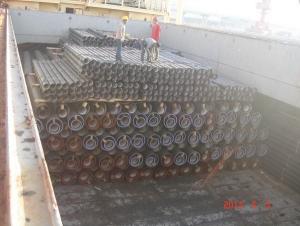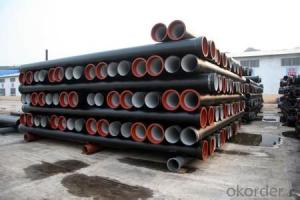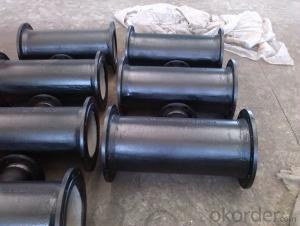DUCTILE IRON PIPE DN400 K10 CLASS
- Loading Port:
- Tianjin
- Payment Terms:
- TT OR LC
- Min Order Qty:
- -
- Supply Capability:
- 30000Tons m/month
OKorder Service Pledge
OKorder Financial Service
You Might Also Like
develop high quality products to ensure the longest service life and wonderful performance.
CNBM Pipelines regard quality as the essential factor leading to successful business. Every pipe is tested in accordance with BS EN545 (water application) or BS EN598 (sewer application). CNBM Pipelines products comply with and are tested according to the relevant European and International Standards. Our pipes are manufactured under the quality management system BS EN ISO 9001. After years of efforts, CNBM Pipelines has built up great reputation in terms of quality and service among customers worldwide
Product Introduction
CNBM ductile iron pipe ranges from DN80-DN1600mm (Tyton, T-Type, Class K7/K8/K9), effective length: 6m, complying with BS EN545/EN598/ISO2531/BS4772.
Specification& Payment terms
Internal lining: Pipes shall have an internal cement mortar lining in acc with ISO4179.
External coating: Pipes shall be externally coated with metallic zinc spray plus a further layer of resin painting to ISO8179.
Gasket: 100% SBR/NBR/EPDM gasket in accordance with ISO4633.
Packing: Pipes from DN100 to DN300 be bundled with steel belts, the others are in bulk.
Payment term: By 30% T/T advance payment + 70% Irrevocable L/C at sight.
Packing: In bulk vessel or in container.
- Q: What are the different types of coatings available for ductile iron pipe?
- The different types of coatings available for ductile iron pipe include cement mortar lining, polyethylene sleeving, polyurethane coatings, and epoxy coatings. Each coating offers specific benefits such as corrosion resistance, improved flow characteristics, and protection against external elements.
- Q: Can ductile iron pipes be used for railway bridges?
- Yes, ductile iron pipes can be used for railway bridges. They are commonly used in bridge construction due to their high strength, durability, and resistance to corrosion. Additionally, ductile iron pipes can withstand heavy loads and provide excellent structural support, making them suitable for railway bridge applications.
- Q: What are the different methods for restraining ductile iron pipe?
- There are several different methods for restraining ductile iron pipe. These methods are used to prevent movement or displacement of the pipe due to internal pressure, external forces, or ground movement. The most common methods for restraining ductile iron pipe include: 1. Thrust blocks: Thrust blocks are concrete blocks or structures that are placed against the pipe at bends, tees, or other changes in direction. These blocks are designed to resist the forces exerted by the flowing water or other fluids within the pipe, effectively anchoring the pipe in place. 2. Mechanical restraints: Mechanical restraints, such as harnesses or clamps, are devices that are installed around the pipe and attached to a fixed structure, such as a wall or a concrete anchor. These restraints provide a physical barrier that prevents the pipe from moving or shifting. 3. Pipe restraints: Pipe restraints are devices that are directly attached to the pipe and anchored to a fixed structure. These restraints can include pipe clamps, pipe restraints, or pipe saddles. They are designed to securely hold the pipe in place and resist any movement or displacement. 4. Pipe bedding and backfill: Proper pipe bedding and backfilling is important for restraining ductile iron pipe. The pipe must be properly supported and surrounded by compacted material to prevent movement or shifting. This method involves carefully placing and compacting soil or other suitable materials around the pipe to provide stability and prevent displacement. 5. Trench walls: The walls of the trench in which the ductile iron pipe is installed can also provide some level of restraint. By properly compacting the soil against the pipe and ensuring proper compaction and stability of the trench walls, the pipe can be effectively restrained and prevented from movement. Overall, the different methods for restraining ductile iron pipe aim to ensure the pipe remains securely in place and does not experience any displacement or movement. The choice of method depends on factors such as the location, application, and the forces acting on the pipe. It is important to consult with engineers and follow industry guidelines and standards to determine the most appropriate method for restraining ductile iron pipe in specific situations.
- Q: How is ductile iron different from cast iron?
- Ductile iron and cast iron are two iron alloys with varying compositions, properties, and uses. The primary distinction between the two lies in their microstructure and mechanical properties. Ductile iron, also known as spheroidal graphite iron or nodular cast iron, is a type of cast iron that undergoes an extra treatment process to enhance its strength and ductility. This is achieved by adding small amounts of magnesium to the molten iron during casting, resulting in the formation of graphite nodules throughout the material. These nodules act as stress raisers, preventing crack propagation and making ductile iron more resistant to fractures and more flexible compared to cast iron. In contrast, cast iron is an iron alloy with a higher carbon content than ductile iron. This higher carbon content leads to the formation of graphite flakes within the material, giving cast iron its characteristic brittleness. Due to its brittleness, cast iron is more prone to cracking and less flexible than ductile iron. However, cast iron exhibits excellent compressive strength and is highly resistant to wear and abrasion, making it suitable for applications where strength and durability are crucial, such as engine blocks, pipes, and manhole covers. Another difference between ductile iron and cast iron can be observed in their machinability. Ductile iron is generally easier to machine due to its lower carbon content and the presence of graphite nodules, which act as lubricants during the cutting process. On the other hand, the presence of graphite flakes in cast iron can cause tool wear and result in a poor surface finish during machining. In summary, ductile iron and cast iron differ in their microstructure, mechanical properties, and applications. Ductile iron offers improved ductility and fracture resistance, making it suitable for applications that require flexibility and impact resistance. Cast iron, with its higher carbon content and graphite flakes, provides excellent compressive strength and wear resistance, making it ideal for applications that demand strength and durability.
- Q: What is the ductile cast iron pipe
- Cast iron pipe is called a coiled pipe, one is the mouth, and the other is the flange. It is often used in the joint of the cast iron pipe valve, and is often used in conjunction with the second pipe (plug pipe coil)
- Q: What are the different corrosion protection options for ductile iron pipe?
- There are several corrosion protection options available for ductile iron pipe to ensure its longevity and durability. These options include: 1. Cement Mortar Lining: This involves coating the inner surface of the pipe with a layer of cement mortar, which acts as a barrier between the pipe and corrosive elements in the water or soil. Cement mortar lining provides excellent corrosion resistance and can last for several decades. 2. Polyethylene Encasement: This method involves wrapping the ductile iron pipe with a layer of polyethylene material. The polyethylene acts as a physical barrier, protecting the pipe from external corrosive elements. Polyethylene encasement is commonly used in aggressive soil conditions and can offer long-lasting protection. 3. Internal and External Coatings: Various types of coatings can be applied to the inner and outer surfaces of the ductile iron pipe to provide corrosion resistance. These coatings can be epoxy, polyurethane, or fusion-bonded epoxy (FBE) coatings. These coatings create a barrier between the pipe and the surrounding environment, preventing corrosion. 4. Cathodic Protection: This method involves using an electrical current to protect the pipe from corrosion. Cathodic protection systems can be either galvanic (sacrificial anode) or impressed current systems. These systems direct the flow of electrons to prevent the oxidation of the ductile iron pipe. 5. Zinc Coating: Zinc coating, also known as galvanizing, involves applying a layer of zinc to the surface of the ductile iron pipe. The zinc acts as a sacrificial anode, corroding instead of the iron pipe. Zinc coating provides effective corrosion protection, particularly in soil conditions with low resistivity. It's important to note that the choice of corrosion protection option for ductile iron pipes depends on various factors such as the environment, water chemistry, soil conditions, and expected service life. Consulting with corrosion protection specialists and engineers can help in selecting the most suitable option for specific applications.
- Q: Why is the cast iron tube lined with cement? Under what circumstances are ductile iron pipes lined with cement, and under what circumstances do not have to be lined with cement?
- Cement lining to protect water quality, reduce loss, improve the service life of the pipeline ductile, ductile iron pipes are generally lined, which the en545 standard specifies the quality of what kind of what kind of cement.
- Q: How can stainless steel pipes and ductile iron pipes be joined?
- Or with a gland type expansion joint, by tightening the pressure plate bolts, sealing pipe fittings and pipe wall, so as to achieve sealing, while retractable function
- Q: Ductile iron pipe length is generally much
- The spheroidal graphite tube of hot film casting process is generally a single branch with a length of 8 meters. The ductile iron pipes produced by this process are usually large caliber pipes. For example, DN1000 or more.
- Q: Can ductile iron pipes be repaired if they get damaged?
- Yes, ductile iron pipes can be repaired if they get damaged. The repair process involves identifying the damaged portion of the pipe and assessing the severity of the damage. If the damage is minor, it can be repaired using various techniques such as welding or epoxy lining. For more extensive damage, sections of the pipe may need to be replaced. Pipe repair professionals have the expertise and equipment to identify and fix damaged ductile iron pipes, ensuring their continued functionality and longevity.
Send your message to us
DUCTILE IRON PIPE DN400 K10 CLASS
- Loading Port:
- Tianjin
- Payment Terms:
- TT OR LC
- Min Order Qty:
- -
- Supply Capability:
- 30000Tons m/month
OKorder Service Pledge
OKorder Financial Service
Similar products
Hot products
Hot Searches
Related keywords
